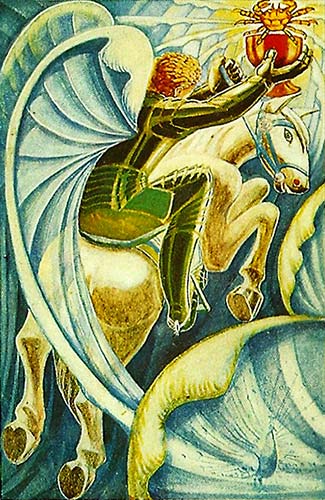
Knight of Cups
The Knight of Cups represents the fiery part of Water, the swift passionate attack of rain and springs; more intimately, Water’s power of solution. He rules the Heavens from the 21st degree of Aquarius to the 20th degree of Pisces. He is clothed in black armour furnished with bright wings which, together with the leaping attitude of his white charger, indicates that he represents the most active aspect of Water. In his right hand he bears a cup from which issues a crab, the cardinal sign of Water, for aggressiveness. His totem is the peacock, for one of the stigmata of water in its most active form is brilliance. There is here also some reference to the phenomena of fluorescence.
The characteristics of the person signified by this card are nevertheless mostly passive, in accordance with the Zodiacal attribution. He is graceful, dilettante, with the qualities of Venus, or a weak Jupiter. He is amiable in a passive way. He is quick to respond to attraction, and easily becomes enthusiastic under such stimulus; but he is not very enduring. He is exceedingly sensitive to external influence, but with no material depth in his character.
When the card is ill dignified, he is sensual, idle and untruthful. Yet with all this he possesses an innocence and purity which are the essence of his nature. But he is, on the whole, so superficial that it is hard to reach this depth. “His name is writ in water.”
In the Yi King, the fiery part of Water is represented by the 54th Hexagram, Kwei Mei. The commentary is singularly obscure, and somewhat sinister. It deals with the difficulties of rightly mating such opposites as fire and water (compare the Queen of Wands; but in that case Water is the calming and modulating influence, while here it is Fire which creates trouble.) Swiftness and violence ill suit a character naturally placid; it is rare indeed to meet with a person who has succeeded in harmonizing these conflicting elements. He tends to mismanage all his affairs; and unless sheer good fortune attend him, his whole career will be an unbroken record of failure and disaster. Often his mental “civil war” ends in schizophrenia or melancholy madness. The abuse of stimulants and narcotics may precipitate the catastrophe.